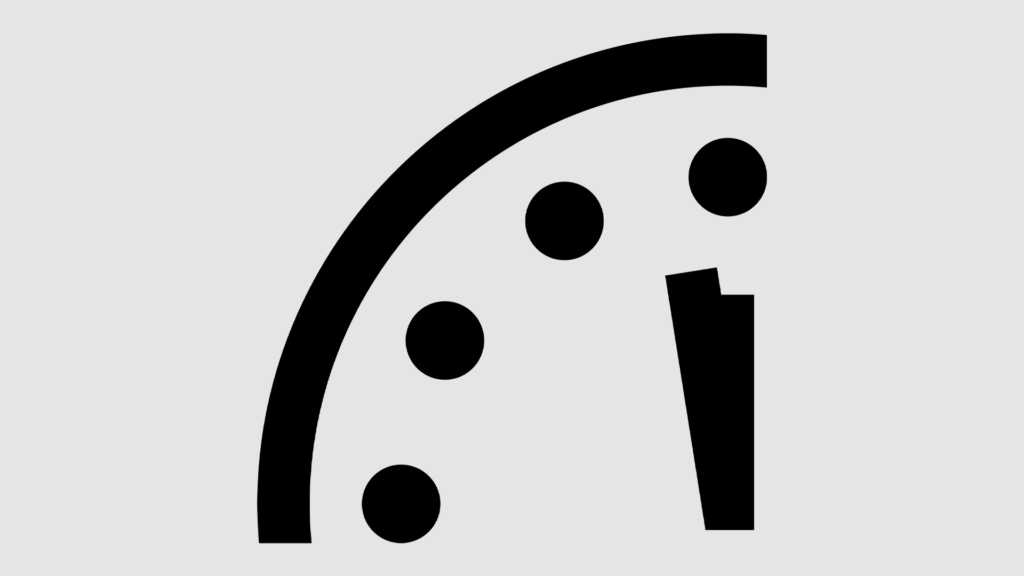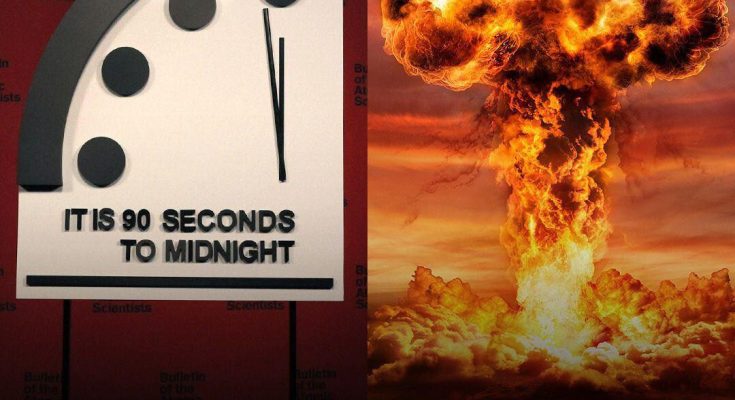Armageddon has never been closer than it is on the Doomsday clock.
According to Reuters, the clock was designed in 1947 as a symbolic timepiece by atomic experts, including Albert Einstein.
The clock, which was first made to alert people to the threat of nuclear war, today serves as a reminder of how close man-made events have brought about complete world destruction.
Although the globe is still in danger from weapons of mass destruction and geopolitical tensions, climate change is currently the biggest threat to the planet.

The Chicago-based non-profit Bulletin of Atomic Scientists updates the clock every year, and this year’s update may be the scariest one yet.
Every year, midnight, which is marked as the point of destruction on the Doomsday Clock, gets closer to the end.
The clock was set at seven minutes to midnight when it was first formed, and since then, it has advanced seventeen times and regressed eight times.
In 1991, with the conclusion of the Cold War, Armageddon was 17 minutes away, the furthest we’ve been from it since the clock’s inception.
This, according to Reuters, is as a result of the US and USSR signing the Strategic Arms Reduction Treaty at this time, which significantly reduced both countries’ nuclear weapon arsenals.
The clock moved forward by 10 seconds in 2023, bringing the total time to midnight to 90 seconds.
This was the closest to Armageddon it has ever been.
Russia’s invasion of Ukraine last year, which rekindled international fears of a nuclear catastrophe, was the main cause of the clock moving ahead.
Rachel Bronson, president of the Bulletin of the Atomic Scientists, told Vice: “Russia’s thinly veiled threats to use nuclear weapons remind the world that escalation of the conflict by accident, intention, or miscalculation is a terrible risk.”
“The possibilities that the conflict could spin out of anyone’s control remain high.”
The statement adds: “The war’s effects are not limited to an increase in nuclear danger; they also undermine global efforts to combat climate change.”
And things don’t appear to be getting much better as long as these tensions remain high and there are now fresh international tensions between Israel and Hamas.
An notification regarding the remaining time on the Doomsday clock was made earlier this year.
Before the revision, 41% of respondents to Manifold Markets‘ survey thought the Doomsday Clock would move closer to midnight in January 2024.
At ninety seconds to midnight, however, the clock is still the closest it has ever been to Armageddon.
It’s important to keep in mind that this is still the closest the clock has ever been to the end of the world, even though it may sound good that it hasn’t gotten any closer.
Rachel Bronson explains: “Countries with nuclear weapons are engaged in modernisation programs that threaten to create a new nuclear arms race.”
“Earth experienced its hottest year on record and massive floods, fires, and other disasters have taken root.”
“And lack of action on climate change threatens billions of lives and livelihoods.”
“Preventing future pandemics has proven useful but it also presents the risk of causing one.”
“And recent advances in recent artificial intelligence raise a variety of questions about how to control a technology that could improve or threaten civilisation in countless ways.”
The contemporary threats, which include nuclear weapons, climate change, and artificial intelligence, “singularly and as they interact, are of such a character and magnitude that no one nation or leader can bring them under control,” according to the Bulletin of the Atomic Scientists website.
The organization states that, to turn back the clock, “three of the world’s leading powers—the United States, China, and Russia—should commence serious dialogue about each of the global threats despite their profound disagreements and ‘take responsibility for the existential danger the world now faces.”



